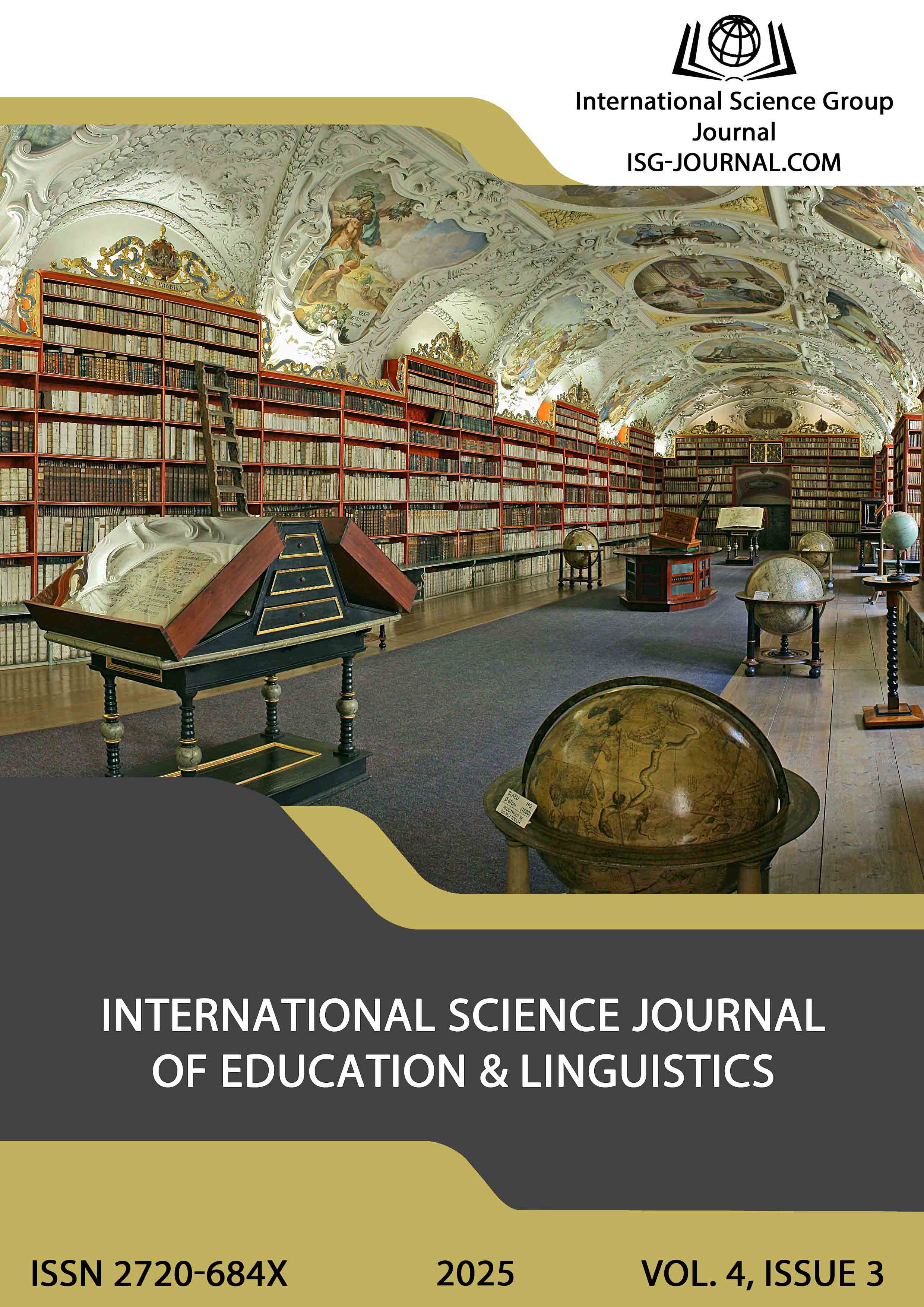Transformed masculinity in contemporary society (based on the collection of short stories ‘Flights of Love’ by Bernhard Schlink)
DOI:
https://doi.org/10.46299/j.isjel.20250403.07Keywords:
masculinity, gender, crisis of masculinity, literature of German-speaking countries, intergender relations, gender socialisationAbstract
The study is devoted to the psychological metamorphoses of male characters and the dynamics of intergender relations between characters of B. Schlink's collection of stories presented to the public under the name ‘Flights of Love’. A brief analysis of the transformation of ideas about male identity in post-war Germany is provided as well, with the help of stories from the collection, which were in turn used as an ideological mirror to highlight European societal change. The study examines the concept of ‘crisis of masculinity’ as a manifestation of the loss or reshaping of male identity in the context of the transformation of socio-cultural norms, identifies the key characteristics of its manifestation in the context of post-war Germany. The study traces the ways of expression and the impact of the crisis on the formation of male images in the collection of Schlink’s stories, as well as the role of periods of socio-economic crisis in gender discourse in the context of rethinking traditional ideas about men and women in society and, in particular, in German-language literature of the late twentieth and early twenty-first centuries. The analysis of the ‘Flights of Love’ collection examines the psychological transformations of male characters in each of the works, their interpersonal and intergender relations, as well as internal conflicts related to the loss of social orientation, emotional vulnerability and the search for identity. The study provides a brief analysis of the female characters in analyzed stories as catalysts for the internal transformations of the male protagonists (overcoming or unsuccessfully compensating for their masculinity crises). By combining the socio-cultural context with literary analysis, the study allows us to further our understanding of the nature of transformations of male identity in German-language prose of the late twentieth and early twenty-first centuries, as well as to outline the prospects for further study of the phenomenon within the framework of German studies, gender studies and literary hermeneutics.References
Connell, R. (2015). Masculinities: The Field of Knowledge. Brill Rodopi, 39–51. https://doi.org/10.1163/9789004299009_004
Бурейчак, Т. (2011). Соціологія маскулінності: навчальний посібник. Львів: Магнолія 2006, 142.
Чернов Ю. (2022). Аналіз провідних теоретичних моделей дослідження маскулінної ідентичності чоловіка. Вчені записки ТНУ імені В.І. Вернадського, 33, 74-80. https://doi.org/10.32838/2709-3093/2022.1/12
Elahe Haschemi Yekani. (2011). The privilege of crisis : narratives of masculinities in colonial and postcolonial literature, photography, and film. Frankfurt am Main: Campus Verlag Gmbh, 320.
Benson, J. (2013). Männer und Muskeln. Über die soziale Konstruktion des männlichen Körperideals. Düsseldorf, 198.
Колодій, М. (2014). "Криза маскулінності та чоловічих студій" у суспільних науках. Соціально-гуманітарні аспекти розвитку сучасного суспільства: матеріали Всеукраїнської наукової конференції викладачів, аспірантів, співробітників та студентів. Суми, 205-208.
Edwards, T. (2006). Cultures of Masculinity. Routledge, 192. https://doi.org/10.4324/9780203005224
Marquardt, R. (1999). Geschlechterverhältnisse der Nachkriegszeit. VS Verlag für Sozialwissenschaften, 21–25. https://doi.org/10.1007/978-3-322-93353-9_3
Stephenson, J (2011). Women in Nazi Germany. London, 232. https://doi.org/10.4324/9781315838175
Scholz, S. (2008). „Sozialistische Helden“. Hegemoniale Männlichkeit in der DDR. Postsozialistische Männlichkeiten in einer globalisierten Welt, Berlin: Lit Verlag, 11-35. https://doi.org/10.25595/1962.
Amlinger, C. (2022). Männer in der Krise: Der fragile Körperzustand der Spätmoderne in der konservativen Gegenwartsliteratur (Tellkamp, Strauß). Internationales Archiv für Sozialgeschichte der deutschen Literatur, 47(1), 9-35. https://doi.org/10.1515/iasl-2022-0002
Шмега, К. (2017). Дослідження маскулінності у літературознавстві: історія, термінологія, проблематика. Південний архів. Філологічні науки, 68. Київ. 149-153.
Bracher, М. (2015). From Antisocial to Prosocial Manhood: Shakespeare’s Rescripting of Masculinity in As You Like It. Configuring Masculinity in Theory and Literary Practice, 58. Brill Rodopl, Boston, 95-127. https://doi.org/10.1163/9789004299009_007
Christine, A. (2007). The Quest for a National Identity: Images of Germany in the Works of Bernhard Schlink. International Journal of the Humanities, 5(7). 105-117. https://doi.org/10.18848/1447-9508/CGP/v05i07/42155
Lorenz, M. (2007). ‚Political Correctness‘ als Phantasma: Zu Bernhard Schlinks „Die Beschneidung“. Literarischer Antisemitismus nach Auschwitz. Stuttgart: J.B. Metzler, 219-242. https://doi.org/10.1007/978-3-476-05224-7_15
Mueller, A. (2007). Forgiving the Jews for Auschwitz? Guilt and Gender In Bernhard Schlink's Liebesfluchten. The German Quarterly, 80. South Carolina, 511-533. https://doi.org/10.1111/j.1756-1183.2007.tb00088.x
Крістєва Ю. Самі собі чужі (2005). Київ: Видавництво Соломії Павличко «Основи», 264.
Schlink, B. (2000). Liebesfluchten. Zürich: Diogenes Verlag, 173. Available at: https://arcrhive.org/details/liebesfluchtenge0000schl/page/10/mode/2up
Becker, P. (2000). Männer, Frauen und deutsche Identitäten - Bernhard Schlinks "Liebesfluchten". Tagesspiegel. Available at: https://www.tagesspiegel.de/kultur/manner-frauen-und-deutsche-identitaten-bernhard-schlinks-liebesfluchten-650605.html
Downloads
Published
How to Cite
Issue
Section
License
Copyright (c) 2025 Daria Havryliuk, Khrystyna Pavliuk

This work is licensed under a Creative Commons Attribution 4.0 International License.





